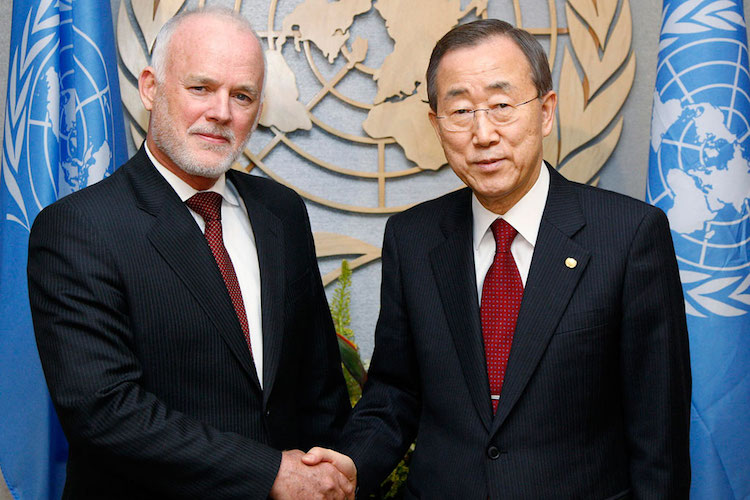Analysis By J. Nastranis
NEW YORK (IDN) – Fiji’s man at the UN, who has been elected as President of the 71st of Session the General Assembly in “a rare secret ballot”, plans to be particularly vocal on the issue of climate change.
It is the first time that a representative of a Pacific small island developing State will serve as head of the United Nations General Assembly (UNGA), which is the main deliberative, policymaking and representative organ of the world body.
The selection of its President follows a geographical rotation system, with respective regional groups putting forward a consensus candidate each year. In this case Asia-Pacific States could not reach consensus on a single nominee.
Subsequently, on June 13, Peter Thomson was pitted against Andreas Mavroyiannis of Cyprus, who was defeated by a secret-ballot vote of 94 to 90, with one abstention.
The last time a secret ballot-vote occurred was in 2012, when the Eastern European States nominated two candidates.
The new President-elect, who will replace current GA President Mogens Lykketoft of Denmark, begins his one-year tenure when UNGA71 convenes at UN Headquarters in New York on September 13. The General Debate will open on September 20.
In the aftermath of the voting, Thomson highlighted that his election marked the first time that a representative of a Pacific small island developing State will serve as UNGA President. He added that as a representative of such a State, he planned to be vocal on the issue of climate change.
However, the universal “high purpose” of the seventy-first session would be momentum on the 2030 Agenda for Sustainable Development and achieving progress on all the 17 Sustainable Development Goals (SDGs), he said.
That would require transforming systems and overcoming intellectual barriers, and without its implementation, the future would be in jeopardy. He pledged to serve the Assembly and the United Nations in the spirit of fidelity and commitment to the common good, in accord with the purposes and principles of the Charter.
The General Assembly also elected by secret ballot 21 Vice-Presidents of its plenary: Congo, Côte d’Ivoire, Djibouti, Mauritania, Nigeria and Zambia from the African States; Bangladesh, Nepal, Solomon Islands and Turkmenistan from the Asia-Pacific States; Armenia from the Eastern European States; Bahamas, Belize and El Salvador from the Latin American and Caribbean States; and Belgium and Germany from the Western European and other States.
The five permanent members of the Security Council – China, France, Russian Federation, United Kingdom and the United States – serve as Vice-Presidents, as well.
Also on June 13, the five of the Assembly’s six Main Committees, in consecutive meetings, elected their chairpersons and members of their respective Bureaux by acclamation.
Congratulating President-elect, Lykketoft noted that Thomson brought extensive experience working in matters of rural development and had also engaged with international affairs for many years.
He expressed his support for Thomson’s preparations to assume the presidency on September 13. Until that date, much work remained to be done during the seventieth session’s final three months, including preparing for a high-level event on large movements of refugees and migrants in September 2016, and further informal dialogues with candidates for the position of Secretary-General.
Lykketoft said he was determined to leave behind a strong Assembly that all States and people could look up to and depend upon, making it more transparent, inclusive and effective.
Congratulating Fiji’s Permanent Representative on his new role, Secretary-General Ban Ki-moon highlighted that the President-elect brings a broad perspective to his new post, having years of experience in the international arena, both working for the Government of Fiji and in the private sector.
“I am confident that he will seek the views of others to forge consensus. As the new President-elect once said, ‘Progress at the United Nations does not emanate from adversarial corners, but from cooperation by those who meet in the middle,” Ban said. He noted that during Thomson’s posting as Permanent Representative, he made his mark as Chairman of the Group of 77 and China.
Ban also said that Thomson gained extensive knowledge of the UN development system as Chair of the Executive Board of the UN Development Programme (UNDP), the UN Population Fund (UNFPA) and the UN Office for Project Services (UNOPS). Moreover, Ban highlighted Thomson’s experience as Vice President of the General Assembly from 2010 to 2011.
“In addition to his staunch commitment to development, the new President-elect brings the very valuable perspective of a small island developing State to this post. He is a staunch advocate of both sustainable development and climate action. I count on him to help us carry out both the 2030 Agenda and the Paris Agreement on climate change,” the Secretary-General said.
The UN chief also said that Thomson will have an opportunity to build on the “extraordinary progress” seen under the leadership of Lykketoft. “At this time, I would like to take this opportunity to particularly commend Mr. Lykketoft for his many important initiatives,” the Secretary-General said.
“Already this month, the Assembly has adopted an action-oriented political declaration on ending AIDS. He has convened thematic debates on pressing global challenges – and he has travelled to the frontlines of crisis,” he added.
Ban also noted that Lykketoft has brought new transparency to the selection process for the next Secretary-General. “This has drawn unprecedented and very welcome attention around the world,” Ban said.
Made up of all the 193 Member States of the UN, the General Assembly provides a forum for multilateral discussion of the full spectrum of international issues covered by the UN Charter. It meets in regular session intensively from September to December each year, and thereafter as required. [IDN-InDepthNews – 15 June 2016]
IDN is flagship agency of the International Press Syndicate.
Photo: Secretary-General Ban Ki-moon (right) and Ambassador Peter Thomson of Fiji, President-designate of the General Assembly’s 71st session (March 2010). UN Photo/Evan Schneider
2016 IDN-InDepthNews | Analysis That Matters
Send your comment | Subscribe to IDN newsletter
Follow us on Twitter and Facebook:
http://twitter.com/InDepthNews

